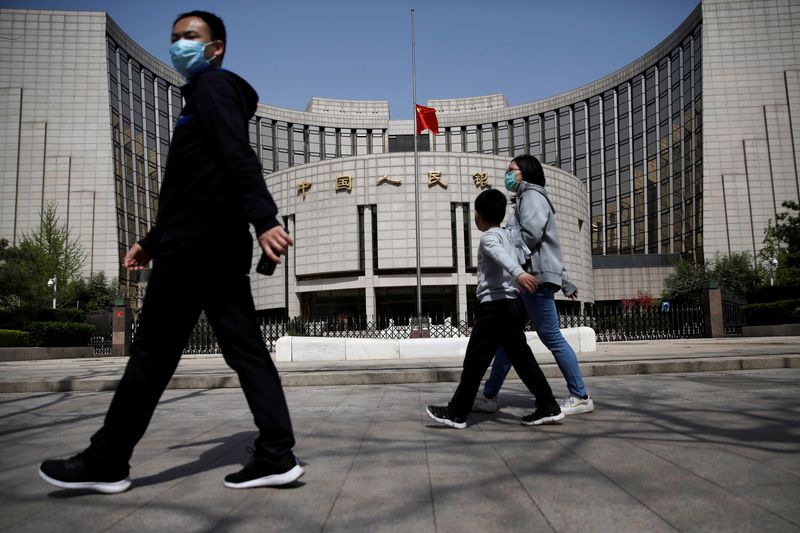China cuts short and long-term rates
2024.07.21 22:32
SHANGHAI/SINGAPORE (Reuters) – China cut short and long-term rates by 10 basis points on Monday, with the central bank saying it was aiming to support growth.
The move follows Beijing’s release of a policy document on Sunday outlining its ambitions for the economy.
The People’s Bank of China cut rates on its seven-day reverse purchase agreements, leading to a similar drop in its loan prime rates (LPR), pulling bond yields down across the curve.
COMMENTS:
BEN BENNETT, HEAD OF INVESTMENT STRATEGY FOR ASIA, LGIM, HONG KONG
“It was definitely a surprise. And even more so given that the PBOC has been guiding bond yields higher. It’s interesting timing coming straight after the third plenum and possibly signals a pro-growth shift. Let’s see if the July politburo follows up with more support.”
GARY NG, ASIA-PACIFIC SENIOR ECONOMIST, NATIXIS, HONG KONG
“If we look at the fundamental situation in the Chinese economy, we have a very weak Q2 GDP data, real rates are very high in China. So basically all the fundamental factors point to the fact that China needs a lower rate environment, especially the real rate is really high…in this kind of disinflationary environment.
“What is surprising to me is that the authorities had probably focused a bit more on the foreign exchange rate and volatility before, but maybe right now they think that the U.S. dollar may not be as strong as before and this time, it opened a door of opportunity for them to act.
“Basically, I think the general trend is that it’s pretty much in line with the fact that the economy is not that great, and it seems that there’s a bit of urgency from the authorities to stimulate it now.”
TOMMY XIE, HEAD OF GREATER CHINA RESEARCH, OCBC, SINGAPORE
“The 7-day reverse repo rate cut was in line with consensus, though the timing was a bit surprising. Renewed hope for more monetary policy support has heightened following the third plenum, which emphasized economic reform as a main focus of further comprehensive reforms. The third plenum also set a target to complete all these reforms within five years. This relatively short time-frame indicates that China needs to do more to grow the pie further in order to build a high-standard socialist market economy.
“However, it remains to be seen whether the recent LPR rate cut marks the beginning of a fresh rate cut cycle or is simply a symbolic gesture of monetary policy reform. If it is the latter, the rate cut might be a one-off event in the near term.
“The next key event to watch is RRR. With almost 1 trillion yuan in Medium-term Lending Facility (MLF) maturing in August and September, there is a window for the PBOC to replace some of this liquidity with more permanent injections via RRR cut.”
KIYONG SEONG, LEAD ASIA MACRO STRATEGIST, SOCIETE GENERALE, HONG KONG
“Today’s 7-day RR cut with a subsequent 10bp cut to 1y and 5y LPR to 3.35% and 3.85% could spark a further China bond market rally with resurrected monetary easing expectations. However, that’s what the PBOC has tried to avoid.
“In this context, the PBOC adds to another layer of supporting local institutions’ long-dated bond selling with smaller collateral for MLF (medium-term lending facility). In other words, it can be interpreted that a lack of collateral for MLF may not be an excuse of holding long-dated bonds anymore.”
JU WANG, HEAD OF GREATER CHINA FX & RATES STRATEGY, BNP PARIBAS
“PBOC starts to implement pro-growth policy, consistent with the message out of the Plenum – authorities are committed to reach whole year GDP target, and policies will adjust after the disappointing Q2 GDP.
“Rising Fed cut expectation also gives PBOC room to do so. Special LGB issuance will accelerate and some further relaxation in property policies is likely too. This is consistent with our thinking that China rates curve should steepen into Q3.
“Knee-jerk reaction is negative for CNH, but we think if non-monetary policies are going to step up here, USD-RMB should still be stabilised around the current level, especially given now that the market is looking for a Fed cut in September.”
LYNN SONG, CHIEF CHINA ECONOMIST, ING, HONG KONG
“The timing may have been a little bit surprising given the MLF was left unchanged earlier this month, but this may have been a move in order to signal the 7-day reverse repo’s future as the PBOC’s main policy rate. The cut itself however was not surprising, as recent weak data increased pressure for monetary easing, and we have been looking for 1-2 rate cuts for some time.

We believe the PBOC held back from monetary easing in the past few months in large part due to its priority to maintain currency stability amid a strong dollar trend. The recent dovish developments in the U.S. and slight softening of the dollar over the past month may have created a suitable window for the PBOC to cut rates.
In a vacuum, the PBOC lowering short-term rates should add to depreciation pressure in the near term, though the actual impact will depend on various factors, including the daily CNY fixings, the transmission effect of the 7-day reverse repo cut on market rates, U.S-side developments, and capital flow developments.”








